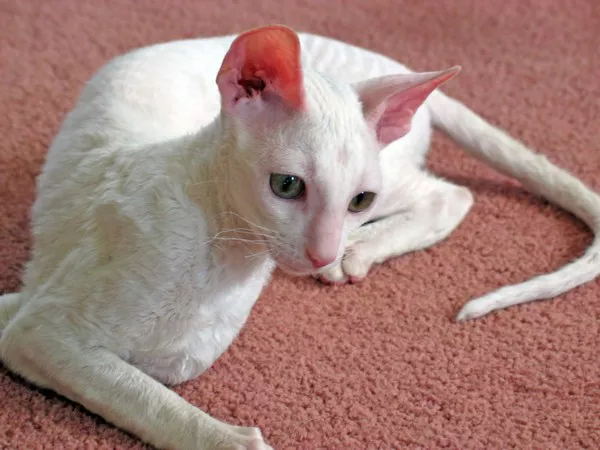Cornish Rex cats, with their distinctive curly coats and slender frames, are beloved for their unique appearance and playful personalities. Like all breeds of cats, Cornish Rex kittens undergo significant growth and development during their first few months of life. Understanding the ideal weight range for Cornish Rex cats at 6 months of age is essential for ensuring their health and well-being. In this article, we explore the factors influencing the weight of Cornish Rex kittens at 6 months and provide guidance for owners seeking to monitor their kitten‘s growth.
Introduction to Cornish Rex Cats: A Brief Overview
A Unique Breed
Cornish Rex cats are a distinct breed known for their unusual appearance and distinctive coat texture. Originating from Cornwall, England, in the 1950s, Cornish Rex cats have a genetic mutation that results in their characteristic curly fur, which lacks the typical outer coat and guard hairs found in most cats. Their sleek, muscular bodies, large ears, and expressive eyes contribute to their elegant and captivating appearance.
Playful Personalities
In addition to their unique appearance, Cornish Rex cats are renowned for their playful and affectionate personalities. They are often described as social, outgoing, and highly intelligent companions who enjoy interactive play, exploring their surroundings, and spending time with their human families. Cornish Rex cats thrive on attention and companionship, making them ideal pets for households seeking an active and engaging feline companion.
Understanding Growth and Development in Cornish Rex Kittens
Early Growth Stages
During the first few months of life, Cornish Rex kittens undergo rapid growth and development as they transition from newborns to independent young cats. Like all kittens, Cornish Rex kittens are born small and helpless, relying on their mother’s milk for nourishment and warmth. As they grow, they begin to explore their environment, develop their motor skills, and interact with their littermates and human caregivers.
Nutritional Needs
Proper nutrition is essential for supporting the healthy growth and development of Cornish Rex kittens. A balanced diet that provides essential nutrients, vitamins, and minerals is crucial for ensuring optimal health and vitality. High-quality kitten food formulated specifically for the nutritional needs of growing cats is recommended to support healthy growth and development. It’s important to follow feeding guidelines provided by your veterinarian or the food manufacturer to prevent overfeeding or underfeeding.
Physical Development
Cornish Rex kittens typically reach key developmental milestones during their first few months of life. By 6 months of age, they should have achieved a significant portion of their adult size and weight, although some growth and maturation will continue into adulthood. Monitoring your kitten’s growth and development, including their weight, body condition, and overall health, is important for ensuring they are progressing as expected and are healthy and thriving.
Determining the Ideal Weight of Cornish Rex Kittens at 6 Months
Variability in Growth
Like all breeds of cats, there is variability in the growth and development of Cornish Rex kittens. While there are general guidelines for the expected weight range of Cornish Rex kittens at 6 months of age, individual factors such as genetics, diet, health, and environmental conditions can influence their growth rate and weight. Some kittens may reach the upper end of the weight range, while others may fall below or within the average range.
Average Weight Range
On average, Cornish Rex kittens at 6 months of age typically weigh between 5 to 7 pounds (2.3 to 3.2 kilograms), although individual variation is common. Female kittens may be slightly smaller and lighter than male kittens, but both genders should fall within the expected weight range for their age and breed. It’s important to remember that these are general guidelines, and there is some flexibility in what constitutes a healthy weight for an individual kitten.
Healthy Body Condition
In addition to monitoring your kitten’s weight, it’s essential to assess their body condition to ensure they are at a healthy weight for their age and breed. A healthy Cornish Rex kitten should have a sleek, muscular body with a visible waistline and ribs that can be felt but not seen. Their coat should be glossy and well-groomed, with no signs of excessive thinness or obesity. If you have any concerns about your kitten’s weight or body condition, consult your veterinarian for guidance and advice.
Promoting Healthy Growth and Development in Cornish Rex Kittens
Nutritious Diet
Providing a balanced and nutritious diet is essential for supporting the healthy growth and development of Cornish Rex kittens. Choose high-quality kitten food that is appropriate for their age, size, and activity level. Look for formulas that are rich in protein, essential fatty acids, vitamins, and minerals to support their growing bodies. Avoid overfeeding or feeding excessive treats, as this can lead to weight gain and other health problems.
Regular Veterinary Check-ups
Regular veterinary check-ups are crucial for monitoring your Cornish Rex kitten’s growth and development, as well as detecting any potential health issues early on. Your veterinarian can assess your kitten’s weight, body condition, and overall health, provide preventive care such as vaccinations and parasite control, and offer guidance on nutrition, behavior, and wellness. Establishing a relationship with a veterinarian you trust is important for ensuring your kitten receives the best possible care throughout their life.
Physical Activity and Enrichment
Encouraging regular physical activity and mental stimulation is important for promoting the health and well-being of Cornish Rex kittens. Provide plenty of opportunities for play, exploration, and exercise, both indoors and outdoors in a safe and supervised environment. Interactive toys, climbing structures, and puzzle feeders can help keep your kitten engaged and entertained, while also providing valuable enrichment and stimulation for their body and mind.
Conclusion: Nurturing Healthy Cornish Rex Kittens
In conclusion, understanding the ideal weight range for Cornish Rex kittens at 6 months of age is important for ensuring their health and well-being. While there is variability in growth and development among individual kittens, monitoring their weight, body condition, and overall health is essential for detecting any potential issues early on and providing appropriate care and support. By providing a balanced diet, regular veterinary care, and plenty of opportunities for physical activity and enrichment, you can help ensure that your Cornish Rex kitten grows into a healthy, happy, and thriving adult cat.



























